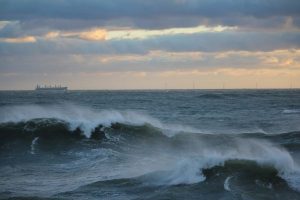With the accelerated growth of offshore wind in the United States, the University of Rhode Island has organized the 2021 Offshore Renewable Energy: Learning As We Go Webinar and Podcast Series to share our learning of various aspects of the offshore wind energy (OWE) industry.
While our 2020 webinar series focused on answering questions about the benthic (seafloor) environment and offshore wind, this segment of the series will focus on facilitating discussions based upon the following questions: How can we use port infrastructure investment as an opportunity to develop green ports? What skills and networks should students foster to be best prepared to work in the offshore wind development industry? What is the role of research platforms in advancing offshore renewable energy? and What strategies and techniques can be applied to use the ocean more efficiently?
In partnership with District Hall Providence, and others, and based on the best available science and best practices, these events will allow stakeholders to ask questions to both researchers and other participants with each event providing additional resources. Our 2021 webinar/podcast series continues to serve as an opportunity to ask the questions necessary to improve upon decision making while encouraging the appropriate growth of offshore wind energy. It is a chance to help us all – Learn as we go!
Offshore Renewable Energy: Learning as We Go Webinar and Podcast Series
Session #1: Gearing Up for Offshore Wind Development: An Opportunity for Building Coordinated and Sustainable Working Waterfronts (Podcast)
With the accelerated growth of offshore wind in the Northeast, states are aggressively investing in upgrading their port infrastructure. This podcast will discuss how the Northeast ports are moving forward with this development and consider how this enormous investment can be used to develop more sustainable (green) ports and increased coordination amongst states and ports to respond to the entire OWE supply chain. In addition to US examples, the European experience, especially within the United Kingdom, will be shared to propose strategies and opportunities to appropriately respond to offshore wind development needs while also responding to the needs of the countries’ other blue economy sectors.
Session #2: Joining the Offshore Wind Energy Workforce: The Answers to All of Your Questions (Webinar)
With the growth of the Offshore Wind Energy (OWE) industry taking place right in our backyard, the question is posed, how can current students and recent graduates best prepare themselves to enter this new workforce? This roundtable-style workshop will feature a discussion between a panel of industry professionals and URI students covering topics from what employers look for in an applicant to how the industry is developing in relation to existing energy industries. Join us!
Watch the Recording Below
Session #3: Negotiating Partnerships Between Communities and the Offshore Wind Industry (Webinar)
Municipalities, both in the US and abroad, are finding themselves at the negotiating table with offshore wind developers to identify agreeable compensations that allow developers to site and land transmission lines and other offshore wind infrastructure within their communities. Although the process to create a community benefits package can assist in addressing the perceived imbalance between the impacts and advantages from new developments, there are limitations and common pitfalls to these activities. These processes also require a thoughtful and long-term commitment by the municipality and developer to ensure that the needs of the beneficiaries are being met in a fair and transparent manner. This panel of both researchers and stakeholders will share their firsthand experiences and findings for implementing different community benefit agreement strategies and tools.
Thursday, March 18th 9AM EST
Watch the Pre-Recorded Presentations Then the Discussion Recording Below
Additional Resources
- Engaging Communities in Offshore Wind: Case Studies and Lessons Learned from New England Islands (Full text)
- Community Benefits from Offshore Renewables: Good Practice Review (Full text)
- Community Benefits from Offshore Renewables: Good Practice Review – Executive Summary (Full text)
- Monhegan CBAC Report (Full text)
- Island Institute Solutions Library
Session #4: Offshore Renewable Energy and Working Waterfronts: The Roles of Research Platforms and Community Engagement (Webinar)
As our nation looks to grow its production of renewable energy, offshore options such as wind, tidal and wave will become increasingly important. What will this mean for working waterfronts in terms of creating new jobs, revitalizing harbors, increasing demand for waterfront space, and displacing traditional working waterfront uses? In addition, what is the role of research platforms in advancing these ocean technologies while honoring and minimizing the impact of existing resource users and the natural environment? Panelists, representing PacWave from Oregon (wave energy) and Aqua Ventus from Maine (floating wind), and the Redwood Coast Energy Authority from Humboldt County, California, will explore these questions as well as share some of the economic and community successes, challenges and lessons learned.
Thanks to our program partner, National Working Waterfront Network. The National Working Waterfront Network (NWWN) is a nationwide network of businesses, industry associations, nonprofits, local governments and communities, state and federal agencies, universities, Sea Grant programs, and individuals dedicated to supporting, preserving, and enhancing our nation’s working waterfronts and waterways. Participation in the NWWN is open to all individuals and organizations involved in working waterfront issues at the federal, state, and local level. Our mission is to increase the capacity of coastal communities and stakeholders to make informed decisions, balance diverse uses, ensure access, and plan for the future of their working waterfronts and waterways. For more information, please visit: https://nationalworkingwaterfronts.com
Tuesday, April 27th 2PM EST
Watch the Pre-Recorded Presentations Then the Discussion Recording Below
Additional Resources
- Working Waterfronts Podcast – Understanding the Working Waterfronts’ Contribution to the Blue Economy (Podcast Episode)

